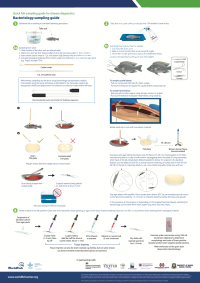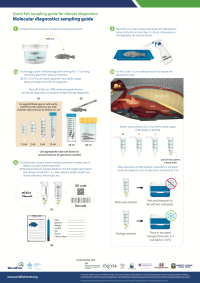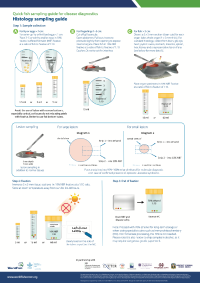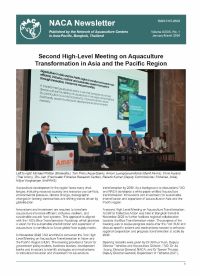With the implementation of the new aquatic animal disease reporting in the Asia Pacific region from January 2021, and in lieu of the published QAAD Reports (last issue published was 4th quarter of 2020), NACA is publishing reported aquatic animal diseases submitted by countries in the Asia-Pacific region. This report covers the third quarter of 2023 and the original and updated reports can be accessed from the QAAD page.
Bacterial diseases represent one of the major impediments to sustainable aquaculture. Routine screening for bacterial pathogens at various life stages of tilapia, carp and catfish a are important to minimise their introduction into production systems and before they can cause serious diseases and spread to new areas. During an abnormal mortality event, routine sampling for bacteriology from moribund animals should take place rapidly as part of the disease diagnostic investigation. Bacteriology is the culture and identification of bacteria growing under specific conditions. WorldFish and partners developed this quick guide on fish bacteriology sampling. Standard bacteriology is a swab taken from the caudal or anterior kidney and inoculated onto agar (e.g. Tryptone soya agar) to screen for systemic bacterial infection. Additional swabs may be included in the presence of external or internal lesions/ulcers (e.g., eye, skin, mouth, liver, spleen, brain). A free online training course on bacteriology sampling is also available via Learn.ink.
Major pathogens of fish and other farmed aquatic animals include bacteria, fungi, viruses and parasites. These can lead to serious infectious diseases and losses representing one of the major limitation to sustainable aquaculture. Routine health checks for key priority pathogens of tilapia, carp and catfish—will vary with geographies—are important to minimize the risk of their introduction, transmission and spread. On suspicion of an unknown disease during abnormal mortalities, it is routine for the investigators to collect clinical samples from moribund fish for molecular and virology diagnostics. Molecular diagnostics are techniques used to amplify small DNA/RNA sequence(s) that are unique to a particular pathogen to ascertain their presence or absence. Virology is a branch of microbiology that study viruses and viral diseases. WorldFish and partners developed this quick fish sampling guide for molecular and virology diagnostics. Standard specimens for general molecular and virology health evaluation include kidney, liver, spleen, brain and gills. Other tissues may be collected.
During investigation of an abnormal mortality event, fish tissues (or biopsies) for histopathology analysis are collected for disease diagnosis. Histology consists in the preparation of thin, stained tissue sections for microscopic examination to study their structure and function. Histopathology is the study of disease and disease processes by looking at the change in the anatomy or anomalies from cells, tissues and organs as seen through a microscope. WorldFish and partners developed this quick fish-sampling guide for histology. Standard biopsy specimens for histological examination consists of fixed sections of brain, gill, heart, intestine, kidney, liver and spleen. Other tissues may be collected in the presence of external lesions/ulcers (e.g., eye, skin, muscle). A free online training course on histology sampling is also available via Learn.ink.
In this issue:
- Second High-Level Meeting on Aquaculture Transformation in Asia and the Pacific Region.
- Reported aquatic animal diseases in the Asia-Pacific region during the second quarter of 2023.
- Expert Workshop on Aquaculture Effluent Management.
- Larvi 2024: First announcement and call for papers.
- Tuskfish CMS 2.0.7 released.



